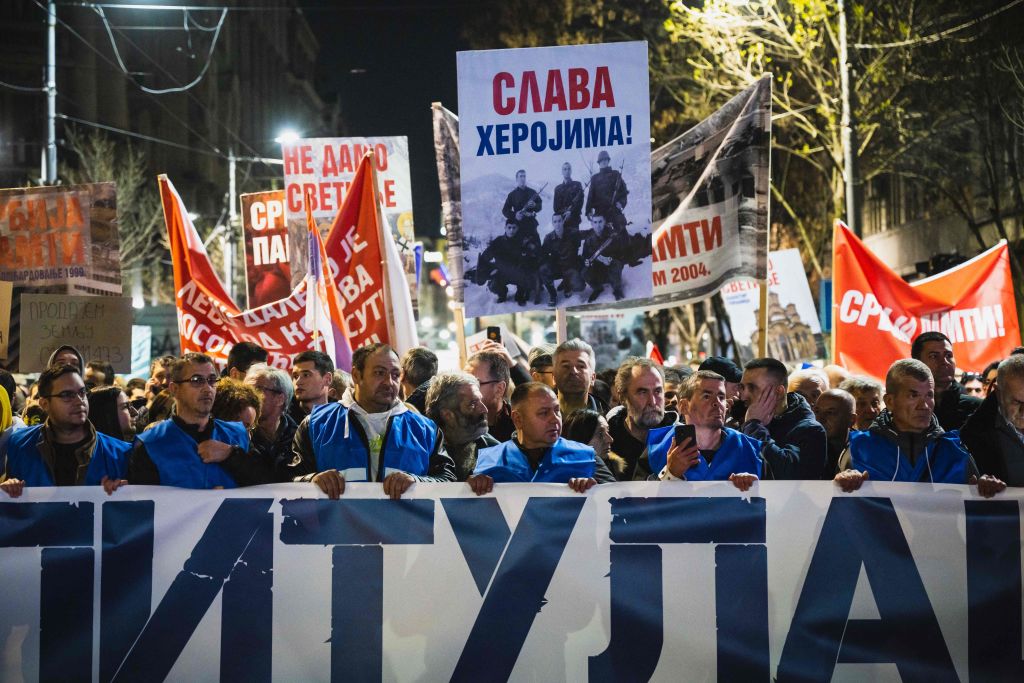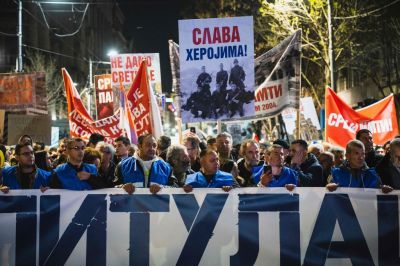A new round of reconciliation talks between Serbia and Kosovo is a chance for the West to solve a longstanding dispute in the Balkans and deprive the Kremlin of one of its last remaining European partners in one fell swoop. But Moscow’s meddling in Serbia threatens the process.
On Friday, thousands of protesters—some carrying Russian flags and others reportedly donning Wagner Group paraphernalia—marched through Serbia’s capital of Belgrade to oppose European Union-brokered efforts to normalize ties with Kosovo. The protest was just one in a string of rallies held by far-right and pro-Russian groups in Serbia’s capital since Russia’s full-scale invasion of Ukraine last year.
“This is not hybrid influence,” said Čedomir Stojković, a Belgrade-based attorney who tracks Russia’s proxies in Serbia. “It’s a hybrid occupation. Because it’s so strong that our government, basically, is not our government. They do not make decisions which are in the interests of our people.”
Many analysts think this “hybrid occupation” is to blame for Serbia’s rocky relationship with its neighbors, pointing to its tepid cooperation with Kosovo normalization talks as evidence. Kosovo formally broke away from Serbia in 2008, and most Western countries, including the U.S., recognize its independence. European negotiators hoped they’d reached a breakthrough for the two Balkan states and aspiring EU members over the weekend.
After 12 hours of negotiations on Saturday, Serbian President Aleksandar Vučić and Kosovo Prime Minister Albin Kurti agreed to move forward on a normalization accord. “We have a deal,” European Union foreign policy chief Josep Borrell tweeted early Sunday. “The parties have fully committed to honor all articles of the agreement and implement their respective obligations expediently and in good faith.”
The high-level meetings, in theory, set in motion a EU-brokered and U.S.-backed proposal wherein the two Balkan countries pledged nonviolence and mutual recognition of each other’s national symbols and documents, such as passports and diplomas. For Belgrade, which still considers Kosovo to be Serbian territory, implementing an accord with Kosovo would mean the de facto recognition of its neighbor’s sovereignty. Mutual recognition is a key requirement for the countries’ accession into the EU.
Such an acknowledgement would be a welcome development for the West nearly a quarter-century after Serbian-led Yugoslav forces left the Albanian-majority region in 1999. The Yugoslav Wars’ Kosovo chapter—which killed some 13,000 people and displaced hundreds of thousands more—provoked NATO’s intervention after the mass killing of ethnic Albanians raised the spectre of genocide.
The conflict’s ethnic and national tensions simmer to this day. The Kosovo-Serbia deal’s EU mediators hope it will put an into flare-ups at the border, where as recently as December Serbian Prime Minister Ana Brnabic said the Balkan states were “on the verge of armed conflicts.”
But whether Vučić has any intention of actually seeing the normalization process through remains to be seen. Despite giving his verbal agreement Saturday, the Serbian president said afterward that he has not and will not sign anything with Kosovo. “I don't want to sign any international legally binding documents with Kosovo because Serbia does not recognize its independence,” Vučić told reporters Sunday.
“Normalization is going to be very hard, and maybe even impossible, with this kind of attitude,” Engjellushe Morina, an expert on the Western Balkans at the European Council on Foreign Relations, said in an interview.
Domestic political pressures, including Russia’s decades-long influence campaign in Serbia, are likely central in Vučić’s calculation. Not long after Slobodan Milošević’s regime came to an end 2006, a newly-elected Putin began to exert his political will on the small Balkan state by buying up its oil output, investing in universities and political parties, and capitalizing on Serbia’s cultural and religious ties with Russia. The country’s media outlets—largely controlled by the Serbian government—amplify Kremlin talking points.
The strategy has paid dividends since Russia’s invasion of Ukraine. Serbia has been reluctant to join Western sanctions targeting Moscow, despite its bid to join the EU and the expectation that it will conform to the bloc’s foreign policy agenda. Vučić on Sunday criticized the International Criminal Court warrant accusing Putin of war crimes, saying the charge would have “bad political consequences” and hurt peace efforts in Ukraine. While other European countries have closed their borders to Russian exiles since the war’s start, Serbia has given some 200,000 of them visa-free entry.
In the years leading up to Putin’s attack on Ukraine, the Serbian government’s military build-up raised concerns that it might be preparing for an armed confrontation with Kosovo and Bosnia. In 2019, Serbia surpassed NATO member Croatia as the biggest military spender in the Balkans and has continued beefing up its defense budget since, including the purchases of Russian and Chinese fighter jets, drones, and anti-aircraft weaponry. Some analysts think Vučić was betting that a swift Russian victory in Ukraine would provide Serbia cover to attack its neighbors, but Moscow’s flailing war effort prompted Serbia to reconsider Western pushes for normalization with Kosovo—much to Russia’s dismay.
Why would Moscow oppose Serbia’s reconciliation with Kosovo? Bargaining power. Serbia has long depended on Russia’s veto power at the United Nations to prevent Kosovo’s membership in the international body. Moscow, in turn, gets a loyal vassal. A successful EU-sponsored deal could derail that symbiotic relationship.
Putin knows that “when he escalates the crisis in the Balkans, and then deescalates, he can use that as leverage to position himself as a mediator and to tell the West, ‘There is no security in the Balkans without me,’” said Ivana Stradner, an analyst at the Foundation for Defense of Democracies. “Especially now with Ukraine, he can use that—and he has been using that—as a point of leverage to distract the West from Ukraine. It’s a very similar playbook that Russia has also used in Moldova and Georgia. So we know the tricks.”






Please note that we at The Dispatch hold ourselves, our work, and our commenters to a higher standard than other places on the internet. We welcome comments that foster genuine debate or discussion—including comments critical of us or our work—but responses that include ad hominem attacks on fellow Dispatch members or are intended to stoke fear and anger may be moderated.
With your membership, you only have the ability to comment on The Morning Dispatch articles. Consider upgrading to join the conversation everywhere.